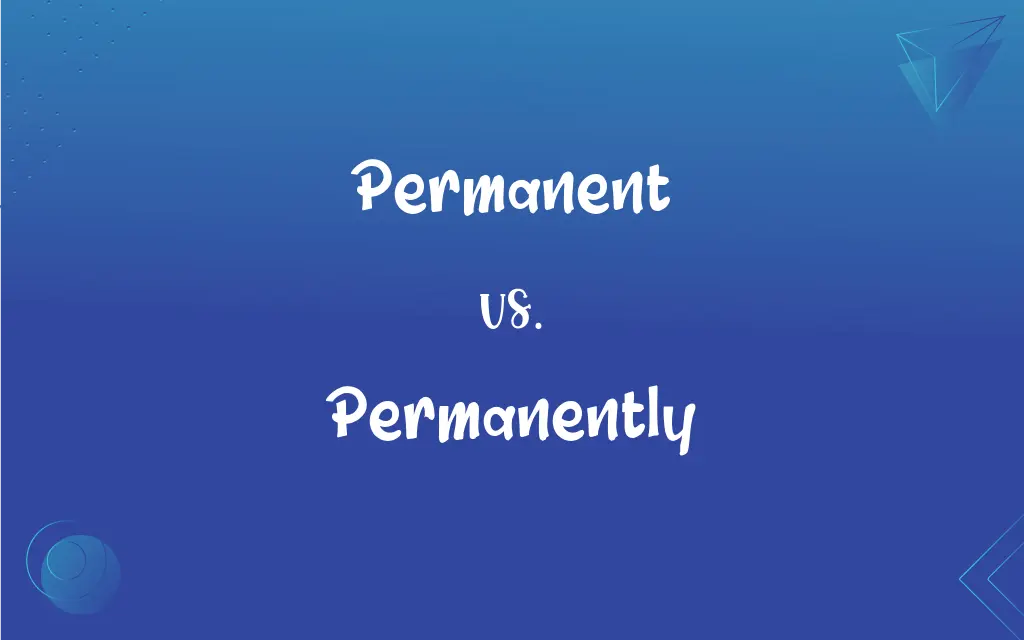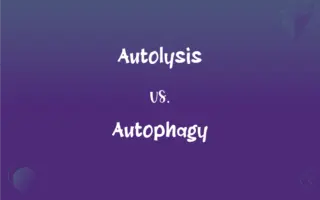Permanent vs. Permanently: What's the Difference?
Edited by Aimie Carlson || By Janet White || Updated on February 5, 2024
Permanent is an adjective meaning lasting or intended to last indefinitely without change, while permanently is an adverb meaning in a way that lasts indefinitely without change.

Key Differences
Permanent, as an adjective, describes something that is meant to last indefinitely without change. It suggests a state of being that does not vary over time. For instance, a permanent job suggests employment that is expected to continue indefinitely, without the anticipation of ending in the near term. On the other hand, permanently, an adverb, modifies verbs to describe an action or condition that occurs in a lasting, unchangeable manner. When something is done permanently, it implies that the action results in a condition that is meant to endure without variation or end.
Permanent is often used to describe objects, conditions, or statuses that are designed to remain unchanged for an indefinite period. This could refer to physical objects, like permanent structures, or situational conditions, such as permanent residency. Permanently, in contrast, describes the enduring nature of actions or effects. When an action is performed permanently, it means the result or impact of that action is intended to last forever, not to be altered or reversed.
When distinguishing between permanent and permanently, it's important to note the grammatical roles they play. Permanent acts as an adjective, qualifying nouns by adding a characteristic of enduring stability. Permanently, however, is an adverb, enhancing verbs with a sense of lasting effect. This difference in usage is crucial for understanding how each word fits into a sentence and influences its meaning.
In the context of change, permanent refers to the unchanging nature of something, indicating that it is set or fixed in a particular state or position for the foreseeable future. Permanently adds a sense of finality to an action, suggesting that once something is done, it cannot be undone or altered. This is a key difference in how each word conceptualizes the idea of longevity and irreversibility.
Permanent and permanently both relate to the concept of time and stability but from different grammatical perspectives. While permanent describes an enduring state of being, permanently refers to the enduring manner in which an action is carried out. This distinction is fundamental to understanding their respective applications in language.
ADVERTISEMENT
Comparison Chart
Part of Speech
Describes nouns (things, people, states)
Modifies verbs, adjectives, other adverbs
Usage
To denote an unchanging state or quality
To indicate how an action is done with lasting effect
Examples
A permanent residence
Settling somewhere permanently
In Sentences
"She has a permanent job."
"He moved abroad permanently."
Relationship to Change
Implies no expected change in the subject described
Suggests actions lead to irreversible conditions
ADVERTISEMENT
Permanent and Permanently Definitions
Permanent
Intended to last or remain unchanged indefinitely.
The sculpture became a permanent fixture in the city park.
Permanently
In a way that lasts indefinitely without change.
The bridge was permanently closed for safety reasons.
Permanent
Established and not subject to alteration.
He earned a permanent position at the university.
Permanently
In an unchangeable and enduring manner.
The document was permanently archived for future reference.
Permanent
Not temporary.
The committee made a permanent decision on the policy.
Permanently
Without the possibility of change or reversal.
The software update permanently deleted the old files.
Permanent
Lasting indefinitely without change.
The museum displayed a permanent collection of ancient artifacts.
Permanently
With lasting effect; forever.
Her life was permanently altered by the accident.
Permanent
Fixed and unchangeable.
She had a permanent smile on her face after hearing the good news.
Permanently
For all time; in a permanent way.
He moved to the countryside permanently to enjoy the peace and quiet.
Permanent
Lasting or remaining without essential change
"the universal human yearning for something permanent, enduring, without shadow of change" (Willa Cather).
Permanently
Lasting or remaining without essential change
"the universal human yearning for something permanent, enduring, without shadow of change" (Willa Cather).
Permanent
Not expected to change in status, condition, or place
A permanent address.
Permanent secretary to the president.
Permanently
Not expected to change in status, condition, or place
A permanent address.
Permanent secretary to the president.
Permanently
Any of several long-lasting hair styles usually achieved by chemical applications that straighten, curl, or wave the hair.
Permanently
In a permanent manner; lastingly.
Permanently
Forever.
Permanently
In a permanent manner.
Permanently
For a long time without essential change;
He is permanently disabled
FAQs
What does "permanent" mean?
"Permanent" describes something lasting or intended to last indefinitely, without change.
Can "permanent" describe changes or effects?
Yes, it can describe changes or effects that are lasting and not reversible, e.g., "permanent damage."
How is "permanent" used in a sentence?
"She was looking for a permanent place to live."
Is "permanent" a formal word?
It's neutral, suitable for both formal and informal contexts.
Can "permanent" refer to attitudes or beliefs?
Yes, it can describe attitudes or beliefs that someone holds indefinitely.
How is "permanently" used in a sentence?
"The accident permanently affected his vision."
Is "permanently" used in legal contexts?
Yes, it can be used to describe conditions or statuses applied for an indefinite duration, like "permanently disabled."
Can "permanent" be used to describe employment?
Yes, it can describe a job position intended to last for an indefinite period, as opposed to temporary.
Is "permanent" only used for physical objects?
No, it can describe situations, conditions, or states that are not expected to change.
How does "permanently" relate to technology?
It can describe actions or settings in technology that are intended not to be changed, e.g., "permanently delete files."
Can "permanently" be used in business?
Yes, it can describe decisions or changes in business practices intended to last indefinitely, e.g., "The policy was permanently altered."
Does "permanently" imply no possibility of change?
It suggests a strong intention or likelihood of no change, though in reality, few things are absolutely unchangeable.
Is there a synonym for "permanent"?
Yes, words like "enduring," "lasting," and "immutable" are synonyms.
What does "permanently" mean?
"Permanently" is an adverb meaning in a way that lasts or remains unchanged indefinitely.
How does "permanently" relate to medical conditions?
It can describe medical conditions or their effects that are lasting and not expected to be reversible, e.g., "permanently impaired hearing."
What is the opposite of "permanent"?
The opposite of "permanent" is "temporary" or "transient."
How does "permanent" relate to tattoos?
In the context of tattoos, "permanent" means the tattoo is intended to last a lifetime, with the ink inserted into the skin's dermis layer.
Can "permanently" describe lifestyle changes?
Yes, it can describe changes in lifestyle or habits that are intended to last indefinitely, e.g., "permanently switching to a vegan diet."
Can "permanently" describe emotional states?
Yes, it can describe emotional or psychological states that are lasting, e.g., "permanently scarred."
Is there a difference between "permanent" and "permanently"?
Yes, "permanent" is an adjective describing the nature of something, while "permanently" is an adverb describing the manner in which an action is done.
About Author
Written by
Janet WhiteJanet White has been an esteemed writer and blogger for Difference Wiki. Holding a Master's degree in Science and Medical Journalism from the prestigious Boston University, she has consistently demonstrated her expertise and passion for her field. When she's not immersed in her work, Janet relishes her time exercising, delving into a good book, and cherishing moments with friends and family.
Edited by
Aimie CarlsonAimie Carlson, holding a master's degree in English literature, is a fervent English language enthusiast. She lends her writing talents to Difference Wiki, a prominent website that specializes in comparisons, offering readers insightful analyses that both captivate and inform.































































